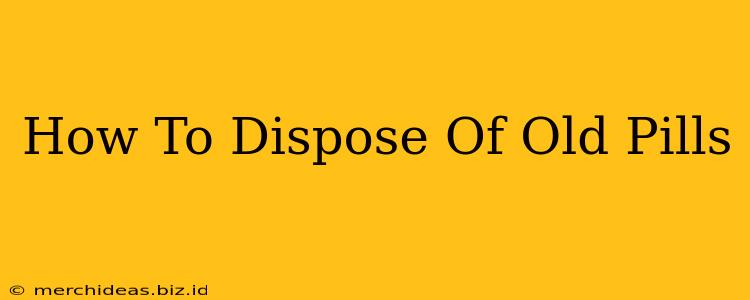Properly disposing of old or expired medications is crucial for protecting your health, the environment, and the community. Improper disposal can lead to accidental poisoning, water contamination, and medication abuse. This guide outlines safe and effective methods for disposing of unwanted pills.
Why is Proper Pill Disposal Important?
Throwing pills in the trash or flushing them down the toilet might seem convenient, but it carries significant risks:
- Accidental Poisoning: Children and pets can easily access medications discarded improperly. Even seemingly harmless pills can cause serious health problems if ingested.
- Environmental Contamination: Flushing medications contaminates water supplies, harming aquatic life and potentially entering the human food chain. Landfills can also leach medication into the soil.
- Medication Abuse: Discarded pills can be misused or abused, contributing to the opioid crisis and other substance abuse issues.
Safe Methods for Disposing of Pills
There are several safe and effective ways to dispose of unwanted pills, depending on your location and the type of medication:
1. Medication Take-Back Programs
This is the best and safest option. Many communities offer free medication take-back programs. These programs provide designated drop-off locations (often pharmacies, police stations, or healthcare facilities) where you can safely dispose of your unwanted pills. Check your local government website, pharmacy websites, or the DEA's website (in the US) for locations near you. Search online for "medication take-back program [your city/state]" to find local options.
2. Using a Home Disposal Method (with Precautions):
If a take-back program isn't readily available, you can use a home disposal method, but it's crucial to follow these steps carefully:
- Mix with an undesirable substance: This makes the pills less appealing and less likely to be ingested accidentally. Common options include kitty litter, coffee grounds, or used tea bags.
- Seal in a sealed bag or container: Place the mixture in a sealed plastic bag or airtight container to prevent leakage and accidental access.
- Throw in the trash: Dispose of the sealed container in your regular household trash.
Important Note: Do not crush pills unless specifically instructed to do so by the medication's label or the instructions provided by your local take-back program. Crushing certain medications can release harmful substances.
3. Specific Medications:
Some medications require special disposal instructions. Always check the medication label or consult your pharmacist for specific guidance. For example, some medications may require flushing down the toilet, but this should only be done if explicitly instructed on the label or by a healthcare professional.
What to Do with Liquid Medications?
Disposing of liquid medications requires a different approach:
- Mix with an undesirable substance: Similar to pills, mix the liquid medication with kitty litter, coffee grounds, or used tea bags.
- Seal in a sealed container: Place the mixture in a sealed container.
- Dispose of in the trash: Dispose of the sealed container in your regular household trash.
Protecting Your Family and the Environment: Key Takeaways
- Check for local take-back programs: This is the safest and most effective method.
- Never flush medications unless instructed: Protect our water systems.
- Follow home disposal instructions carefully: Minimize risks.
- Keep medications out of reach of children and pets: Store medications securely.
- Educate others: Share this information with your family and friends.
By following these guidelines, you can significantly reduce the risk of accidental poisoning, environmental damage, and medication abuse. Remember, proper pill disposal is a shared responsibility that benefits everyone.
